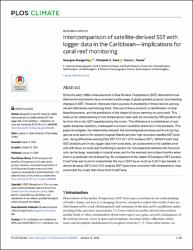/admin/item?itemID=b03d1947-4b99-4659-9390-416213e5070e
Intercomparison of satellite-derived SST with logger data in the Caribbean—Implications for coral reef monitoring

View/
Type of Access
OpenMaterial Type
ArticleType of Content
Scientific researchLanguage
EnglishCollection
- Investigación ambiental [1759]
Metadata
Show full item record| Abstract: | Since the early 1980s measurements of Sea Surface Temperature (SST) derived from satellite-borne instruments have provided a wide range of global gridded products documenting changes in SST. However, there are many sources of uncertainty in these records and significant differences exist among them. One use of these products is identification of coral bleaching events, and the predictions of the impact of future warming on coral reefs. This relies on an understanding of how temperatures near reefs as recorded by SST products differ from the in-situ SST experienced by the corals. This difference is a combination of real spatio-temporal variations, inadequate in product resolution and errors in the products. This paper investigates the relationship between the local temperature measured in-situ by loggers at coral sites in the western tropical Atlantic and two high resolution satellite SST products. Using differences among ESA SST CCI v2.1 (CCI analysis SST), NOAA CoralTemp SST products and in-situ logger data from coral reefs, an assessment of the satellite products with focus on coral reef monitoring is carried out. |
| Author(s): | Margaritis, Georgios
Kent, Elizabeth C. Foster, Gavin L. |
| Date: | 2025 |
| Published: | PLOS Climate, 4(1), e0000480 |
| Citation: | Margaritis, G., Kent, E. C., & Foster, G. L. (2025). Intercomparison of satellite-derived SST with logger data in the Caribbean—Implications for coral reef monitoring. PLOS Climate, 4(1), e0000480. Recuperado de: |
| URI: | https://bvearmb.do/handle/123456789/5946
|
Texto completo del artículo
Access and downloading this document are subject to this license: This is an open access article distributed under the terms of the Creative Commons Attribution License, which permits unrestricted use, distribution, and reproduction in any medium, provided the original author and source are credited.
© 2025 Margaritis et al.
© 2025 Margaritis et al.

